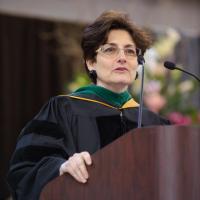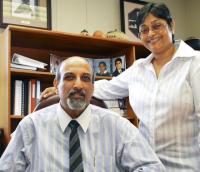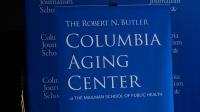The Fried Years
Highlights

The Fried Years timeline was first published as part of Exit Interview, a Q&A in Columbia Public Health Magazine featuring Dean Linda P. Fried, MD, MPH, with alumna and Board of Advisors member Perri Peltz, MPH ’84.
-
2008
2008

Linda P. Fried, MD, MPH, becomes dean of the School. A national leader in the field of geriatric health and epidemiology, she is the first woman in the position.
The Biostatistics Epidemiology Summer Training Diversity Program (BEST) for students from underrepresented backgrounds begins. In subsequent years, it is joined by other “pathway” programs to bring historically marginalized groups into the public health field.
-
2009
2009
A strategic planning process identifies critical issues for public health in the 21st century.
Dean Fried is instrumental in launching Columbia University’s first global center in Europe.
-
2010
2010

Professors Quarraisha Abdool Karim, MS ’88, PhD, and Salim S. Abdool Karim, MS ’88, MD, PhD, publish a study in the journal Science finding that tenofovir gel is effective in preventing HIV transmission in women.
-
2011
2011
The School establishes the Climate and Health Program.
-
2012
2012
Columbia MPH Core
The revamped MPH Core Curriculum debuts, providing a rigorous program of interdisciplinary training in public health science and leadership.
The Center for Injury Science and Prevention, a CDC-funded Injury Control Research Center, is founded.
Columbia Mailman School and the Columbia Journalism School take responsibility for leading Age Boom Academy, a summer boot camp for journalists on aging issues.
-
2013
2013

Robert N. Butler Columbia Aging Center, an endowed, universitywide, interdisciplinary research and policy center housed within the School.
-
2014
2014

Sidney and Helaine Lerner establish the Lerner Center for Public Health Promotion and corresponding endowed professorship in public health promotion.
The Incarceration and Public Health Action Network is developed to examine mass incarceration through a public health lens and incorporate criminal justice reform into public health education.
The Master of Healthcare Administration (MHA), offered through the Department of Health Policy and Management, gives students intensive training in leadership and management along with a broad introduction to public health, health policy, and healthcare systems.
ICAP at Columbia begins providing technical assistance for the Population-based HIV Impact Assessment (PHIA) Project to capture the state of the epidemic in the most affected countries.
-
2015
2015
President Barack Obama cites the School’s research at a White House meeting to shine a light on the link between climate and health.
The first cohort of Tow Scholars is announced. Supported by the Tow Foundation, the program fosters research by mid-career faculty.
Researchers at the School’s Center for Infection and Immunity (CII) report that chronic fatigue syndrome is a physical illness, rather than a psychological disorder. The
Symposium on Preventing Childhood Obesity brings together researchers across disciplines.
-
2016
2016
An international roster of experts gathers in Shanghai to address aging in China and around the world at the Columbia-Fudan Global Summit on Aging and Health.
Fried receives the Inserm International Prize, a scientific award given each year by the French National Institute of Health and Medical Research, the French equivalent of the U.S. National Institutes of Health.
-
2017
2017
The Global Consortium on Climate and Health Education (GCCHE), a network of health professions schools and programs, launches.
-
2018
2018
The School partners with Barnard College to offer a 4+1 program that allows undergraduates to earn an MPH a year after they graduate with a BA. Similar programs follow with other schools.
David Rosner, PhD, MPH, and Gerald Markowitz, PhD, give testimony in a landmark case in which paint manufacturers are found responsible for lead contamination in California. Toxic Docs, a repository of documents related to toxic exposures, launches.
-
2019
2019
The Yusuf Hamied Fellowship Program, supported by the celebrated Indian scientist and pioneering business leader, catalyzes collaborations between researchers at Columbia Mailman School and their counterparts in India.
-
2020
2020
Experts from across the School pioneer testing techniques and therapies for COVID-19, conduct modeling to forecast spread, and offer technical assistance worldwide. Faculty and students support community awareness and vaccine programs.
Students, faculty, and staff create the FORWARD initiative, one in a series of efforts to promote inclusive and equitable education in the field of public health.
The School hosts the inaugural Data Science for Public Health Summit, convening public health leaders to consider the many dimensions of data science in public health.
Faculty, with researchers across the University, launch the Columbia Scientific Union for the Reduction of Gun Violence (SURGE).
-
2021
2021
A team led by Dean Fried synthesizes evidence on the aging-related pathophysiology underpinning the clinical presentation of frailty. The findings appear in the inaugural issue of the journal Nature Aging.
CII launches the Global Alliance for Preventing Pandemics (GAPP) to establish sustainable infrastructure for infectious disease discovery, surveillance, diagnostics, and response through global capacity building.
-
2022
2022
As the School celebrates its centennial, Dean Fried leads a visioning exercise to chart a course for the coming decades.
Dean Fried co-chairs a commission that publishes the National Academy of Medicine Global Roadmap for Healthy Longevity.
-
2023
2023
Dean Fried receives the Insignia of the Chevalier of the Légion d’Honneur, France’s highest order of merit, recognizing her positive impact on France and on a global level.
The School announces the recipients of eight Dean’s Centennial Grand Challenges grants for interdisciplinary research projects that address some of the 21st century’s biggest public health challenges.
The Food Systems and Public Health certificate program launches to train students in the role that food plays in public health.
Columbia Mailman ranks third in the nation for NIH Prime Awards to schools of public health, with a gain of 61 percent since 2018.
The School co-organizes the inaugural Global First Ladies Academy, hosting eight first ladies from African nations and U.S. first lady Dr. Jill Biden.
-
2024
2024
The Columbia Mailman Center for Innovative Exposomics launches to bring sophisticated environmental analysis to open new avenues for prevention and treatments.
Professor Katherine Keyes, PhD ’06, MPH ’10, leads the newly created SPIRIT (Social Psychiatry: Innovation in Research, Implementation, and Training) initiative to catalyze collaboration to address the mental health crisis.




